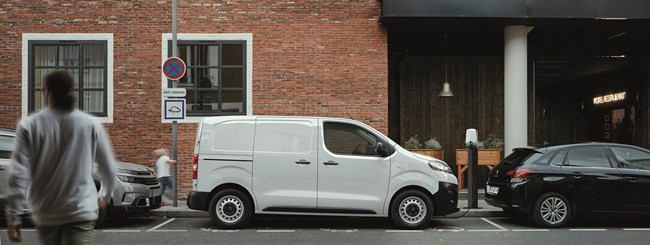- 'Luxury' tax on expensive pick-up trucks suggested
- ADVERTISEMENT FEATURE: Essential advice to avoid the van fleet ICE-berg
- ETRUX launches new Ford E-Transit Trizone
- Renault gives UK debut to Master E-Tech at CV Show
- Isuzu D-Max long-term test – Latest Report
- Isuzu D-Max V-Cross Steel Edition revealed
- IVOTY Report: Stellantis explores the hydrogen proposition
- New Maxus EVs include eDeliver 5 van
- Used LCV values reach six-month high
- ADVERTISEMENT FEATURE: IVECO Daily Mission Awards 2024 Q2 Round-up: Grounds Maintenance & Forestry
What Van? Awards 2021: Van of the Year – Citroen e-Dispatch, Peugeot e-Expert, Vauxhall Vivaro-e
Date: Wednesday, March 24, 2021

The What Van? Van of the Year Award for 2021 goes to three outstanding models, built on the same PSA Group (now Stellantis) platform, which operate in the biggest-volume market sector and look poised to finally banish the doubters and firmly establish electric technology at the heart of the light commercial vehicle industry.
The government’s decision to ban the sale of diesel and petrol cars from 2030 means electric vehicles can no longer operate on the margins, as the choice of businesses wanting to be seen to be green, but must take centre stage.
The Citroen e-Dispatch, Peugeot e-Expert and Vauxhall Vivaro-e are based on internal combustion-engined (ICE) vans that have already proven their quality and practicality under real-world conditions; indeed, the Dispatch and Expert won What Van?’s LCV of the Year prize for 2017, shortly before Vauxhall joined the PSA Group fold.
The plug-in versions of the vans no longer pale in comparison to their diesel stablemates, but can stand shoulder to shoulder when it comes to load-lugging capability, offer practical working ranges between battery charges and, of course, are exempt from any low-emission zone fees.
With more and more electric vans coming to market, the PSA trio, designed with both ICE and EV in mind, look to be the best-equipped to succeed in that they retain the tried-and-tested characteristics of their diesel siblings – unlike the new electric-only Maxus Deliver 3, for example – but are also endowed with sophisticated EV features, unlike Volkswagen’s ABT e-Transporter, which is a simple aftermarket conversion of the diesel equivalent, retaining its donor model’s specifications but with a range of just 92 miles.
Contrastingly, the game-changing e-Expert, e-Dispatch and Vivaro-e offer payloads (up to 1,226kg) and load volumes (up to 6.6m3) that bear comparison to their diesel equivalents. While the battery and motor adds weight, improving battery technology means the removal of the diesel engine and transmission more or less evens out the difference.
These load-lugging credentials are married to driving ranges that top 200 miles, thus delivering the sort of functionality that customers eager to switch to electric vans have been crying out for.
There’s plenty of choice too: the vans are available in single and double-cab guises and while the Vivaro-e comes in two lengths, the e-Expert and e-Dispatch add a third, compact version.
Power for all three comes from a 100kW (136hp) motor producing 260Nm of torque, but more crucial is the choice of two battery sizes. A 50kWh option made up of 18 modules consisting of 216 individual cells has a claimed range of 143 miles, according to the WLTP testing cycle for electric vehicles. The larger 75kWh pack has a range of 205 miles and has 324 cells split over 27 modules. It will, however, reduce the payload to about 1.0t. Importantly, though, it gives the vans much more flexibility and should boost appeal to a wider audience. Cooling for the batteries comes via the vans’ own in-cab cooling systems, which help to increase their range and lifetime.
Being electric, where the full amount of torque is available from just 300rpm all the way until 3,672rpm, these vans are exceptionally quick off the mark. Unladen, they fly off the line and we have no doubt they would still prove to be nippy even with a full payload on board. While limited to 80mph to preserve range, it’s useful to know they can move briskly along to that speed.
Electric vans are, of course, still more expensive to buy up front than ICE alternatives, but with cheaper running and servicing costs, ever-improving technology and growing numbers on the road, as well as continuing government subsidies, the playing field is levelling out.
More customers are also likely to be attracted to PSA’s electric vans when they discover how good they are to drive – being soothingly silent is just one of the advantages.
Two levels of regenerative braking are available and there is a choice of three driving modes, giving 60%, 80% or 100% of power and torque. The vans are quick and responsive and by making good use of the regenerative braking, the footbrake rarely needs to be used.
Plugging into a 100kW public charger can charge the smaller battery pack to 80% in 30 minutes while the larger battery will take 45 minutes. A conventional 7.4kW charging system, compatible with home and office wall boxes, will deliver a full charge overnight.
PSA’s electric medium vans are already attracting interest from large fleets: British Gas has placed an order for 1,000 Vivaro-e vans, which Vauxhall claims is the largest electric vehicle order from a commercial fleet in the UK. The vans will be rolled out to British Gas engineers nationwide over the next 12 months. They will be allocated to engineers who volunteer, but also target areas where emissions need to be lowered.
Another major deal will see Peugeot supply 250 e-Experts to Northgate Vehicle Hire. Northgate has chosen the vans, which will be supplied by Simon Bailes Peugeot, as it moves to increase the number of electric vehicles on its fleet. They will be available to rent from next year.
View The WhatVan Digital Edition


